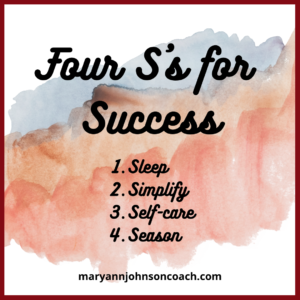 I gave up New Year’s Resolutions many years ago. I always felt set up for failure. I have found it more useful to periodically evaluate how I am managing my life, how I am feeling about it, and what simple adjustments I could make so that I fare better. I emphasize the word simple. I also keep the list short! I want success and not overwhelm.
I gave up New Year’s Resolutions many years ago. I always felt set up for failure. I have found it more useful to periodically evaluate how I am managing my life, how I am feeling about it, and what simple adjustments I could make so that I fare better. I emphasize the word simple. I also keep the list short! I want success and not overwhelm.
The first half of 2020 was challenging for me. In March, I found myself feeling like crying every day. I do not cry! I was so exhausted that it was worrisome. This all compromised my ability to remember things. Nothing outwardly changed. I looked and behaved the same, but it was taking all I had to keep living in my usual way.
Consequently, I began the process of evaluation earlier in the year than usual. What was off? What was making the difference? How was my sleep, my eating, my exercise, my relationships? I was searching for an answer to how I was feeling. In June, I had a thought that led me to a resolution. I remembered a medical condition I had dealt with over a decade and a half earlier. I went to my practitioner, got what I needed, and I was back on track. It was such a relief.
But all that thinking during the spring, all that introspection, reminded me of some behaviors that can significantly impact how we parent, how we manage relationships, how we manage ourselves, and how we feel. I thought as we enter this new year, particularly a year that will still contain Covid, lack of family, more in-home responsibility for parenting and education for some families, that you might benefit from seeing my short and simple ‘go-to’ list when I find my life a bit off-kilter. : )
Four S’s for Success
Sleep – I’ve had tons of experience with this one thing! I was a night owl. I would be up until eleven or twelve getting kids managed and into bed and putting the house back together. Afterward, I read until somewhere between 11 p.m. and 2 a.m. In the morning, I would drag myself out of bed at six or seven, depending on when my kids got up. How do you think that worked out? I’ll bet some of you know. It was a disaster. It’s virtually impossible to parent well when you can barely see for lack of sleep.
Periodically, for over 30 years, I would go in prayer and ask how I could better handle my life. I would always have the same thought, “Go to bed earlier and get up earlier.” I would dismiss the whole idea. I didn’t want to follow that counsel. I wanted my house in order, and I wanted alone time. I was convinced the only way to get either one was to stay up late. So, I resisted. After years, I got desperate. I asked a final time. The impression was the same. “Go to bed earlier and get up earlier.” But this time, I didn’t resist.
I made the decision I would go to bed earlier and get up earlier. Can I say it was hard?! It didn’t get easier after the first month, or the sixth, or even the ninth. I’ll be honest; I struggled for a full year to keep my commitment before it finally began to feel good. But I’d made a decision. I was choosing something different. It was about taking care of self.
I’ve been living this new way for a few years now, and it’s been amazing. I enjoy going to bed earlier and getting up earlier. I can’t even believe it myself! My thinking is clearer. I get to do things that make my day more productive—prayer, personal study, meditation. My whole day runs better. I remain calm more often. I have more patience, and I feel less stress.
If sleep is an issue for you and you decide to take the route I did, it may not be easy, but if you remember that simple things, consistently done over time, make significant differences, you’ll be able to persevere as long as it takes to make this your new habit.
Simplify – The word simplify means to make simpler or easier to do or understand. To simplify is a principle wise men and women have espoused throughout the ages, and with good reason. When we simplify our lives, we manage them better. We can spend more time, both mental and physical, where it matters and less on activities that are not going to matter in the long run. We open time to think. We stop spending so much time putting out fires. When we simplify our lives, we can tune into our children, our spouse, our God.
One of my past mentors said something very profound to me. It’s changed the way I make decisions about spending my time and my family’s time. She said, “Every yes is a no to something else!” Let’s make sure that what we’re saying yes to will, in the long run, bring us true happiness and stable family relationships.
How much time do you allot for technology? How often do you shop? How many hours are you spending in the car, and are you going places that matter? How much time is required to keep your closets and drawers in order? What are your commitments? What are your kid’s commitments? How often do thoughts about past hurts surface? How frequently do you feel resentment?
When you clear out stuff, heal your heart, and empty your calendar, you’ll be less overwhelmed and have more energy. You’ll be able to give more to your family. This investment in simplifying will free you up, and your life and family will be happier. When we simplify, we free up time and energy.
Self-care – Self-care is crucial for parents because it helps them maintain calm for more extended periods. Self-care facilitates patience and staves off, taking our frustrations out on our children. Self-care helps us remain free of resentment, exhaustion, or feeling depleted. It keeps us healthier. Self-care allows us to tune into the joy and satisfaction of having children, even during overly busy or chaotic days.
Self-care benefits not only us but also our whole family. It’s an investment in our family relationships, rather than a selfish indulgence. Self-care is a choice.
You’re going to spend far more time with your children than you’re going to spend without them, so it’s imperative to learn how to self-care while you’re in the thick of parenting. It’s simple, it’s doable, and it takes small amounts of time and virtually no money; but it can and will pay huge dividends.
.
Self-care can be as simple as having a cup of herbal tea while you read to your children. It might be taking a few deep breaths while soothing a screaming child. You could turn on your favorite music and dance in the living room with your kids. Add laughter! Self-care can be taking a walk with your children to take the edge off the day. Sitting in the swing and watching your children play can give you fresh air and a breather from all that you’re feeling pressed to do. Go to the bathroom more often if that’s what will buy you a few moments alone.
Being kind to yourself will make life feel lighter, and your relationships will improve. You’ll feel happier overall. Your self-esteem will go up. You’ll be a better parent. In short, when you care for yourself, you care for your family.
Season – Let me show you two Christmas trees. In 2019 I had two grandchildren born, one in July and  one on Dec. 30. This Christmas, both sets of parents pondered what to
one on Dec. 30. This Christmas, both sets of parents pondered what to  do about their Christmas trees. They have older children. They like their homes to look festive. In the end, they adjusted for the season they are in. One kept all the ornaments on the top half of the tree. The other had a very small tree on a tabletop. It isn’t what they love or do every year, but it is what they did this year. Your season matters and when you honor the season you find yourself in, things feel more peaceful. They could have spent the whole season spanking baby hands or grieving over broken family mementos. But they choose to respect the season their family was in.
do about their Christmas trees. They have older children. They like their homes to look festive. In the end, they adjusted for the season they are in. One kept all the ornaments on the top half of the tree. The other had a very small tree on a tabletop. It isn’t what they love or do every year, but it is what they did this year. Your season matters and when you honor the season you find yourself in, things feel more peaceful. They could have spent the whole season spanking baby hands or grieving over broken family mementos. But they choose to respect the season their family was in.
When you have a new baby, managing your life is entirely different from when you have a couple of teens. When we simplify how we decorate our home, what is on our to-do list and calendar according to the season we find ourselves in, we will be happier and less overwhelmed. We will feel more peace and manage everything better.
This year why not take a careful and honest look at how you are handling the four S’s in your life. With a few simple adjustments, you may have a more peaceful and successful year.



 Two years ago was my 50th high school reunion. I didn’t go. Our family was moving into a new home. The reunion was in Greeley, Colorado, a whole different state. I only went to Greeley West High School for my senior year, and I never really connected. I had friends and was involved on the school radio, worked on the yearbook, did a couple of plays, etc. I was involved but hovered in the background. Just my face in the yearbook.
Two years ago was my 50th high school reunion. I didn’t go. Our family was moving into a new home. The reunion was in Greeley, Colorado, a whole different state. I only went to Greeley West High School for my senior year, and I never really connected. I had friends and was involved on the school radio, worked on the yearbook, did a couple of plays, etc. I was involved but hovered in the background. Just my face in the yearbook.
 On a mature dating site commercial, a giddy woman said, “It’s just like being back in high school.” YIKES! I liked high school. It turned out okay. In my yearbook, I’m listed as “The most typical girl”. But I wouldn’t want to go back!
On a mature dating site commercial, a giddy woman said, “It’s just like being back in high school.” YIKES! I liked high school. It turned out okay. In my yearbook, I’m listed as “The most typical girl”. But I wouldn’t want to go back!
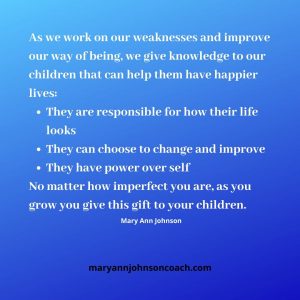 I came from a family of complainers. I can still hear my grandmother complaining to my grandfather about all kinds of things. I can hear my aunts and their complaints. After all, we used to hide under the kitchen table, which had a cloth that reached to the floor and listen in on their private conversations. I, in turn, became a complainer. When I listen to my sisters and cousins, I hear the echoes of those long dead and their complaints. It’s a family tradition, of sorts.
I came from a family of complainers. I can still hear my grandmother complaining to my grandfather about all kinds of things. I can hear my aunts and their complaints. After all, we used to hide under the kitchen table, which had a cloth that reached to the floor and listen in on their private conversations. I, in turn, became a complainer. When I listen to my sisters and cousins, I hear the echoes of those long dead and their complaints. It’s a family tradition, of sorts.



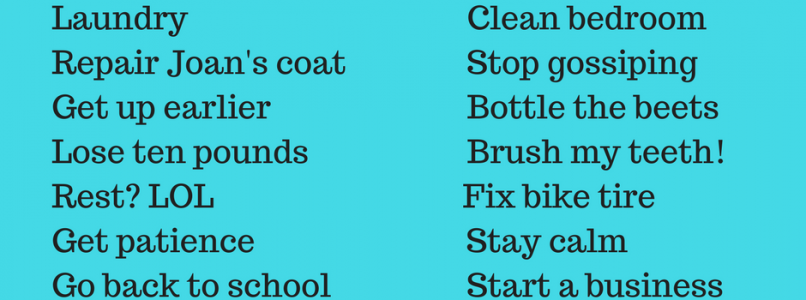
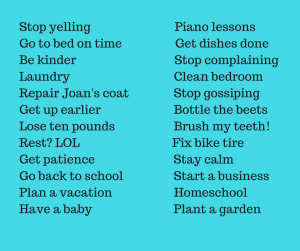 Choosing one ‘best’ thing to work on right now makes ALL the difference in how much success you will have in making changes in your life.
Choosing one ‘best’ thing to work on right now makes ALL the difference in how much success you will have in making changes in your life.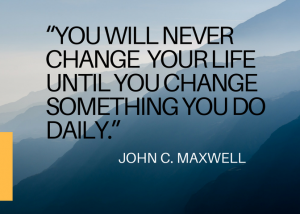

 100% Devil
100% Devil 1% Principle
1% Principle
 Merry Christmas and Happy New Year!
Merry Christmas and Happy New Year! • Understand that the first step in change is awareness. When you mess up and then recognize the mess up, rejoice. You are in the first step. Don’t stress about how long you stay on step one. Don’t quit!
• Understand that the first step in change is awareness. When you mess up and then recognize the mess up, rejoice. You are in the first step. Don’t stress about how long you stay on step one. Don’t quit!